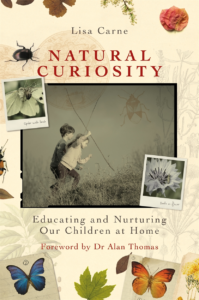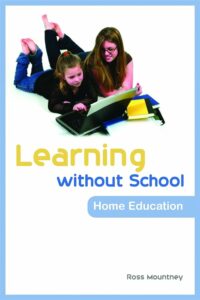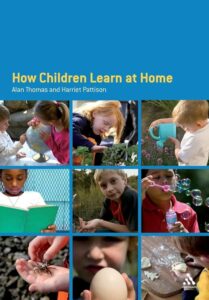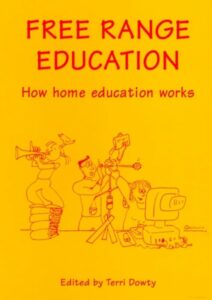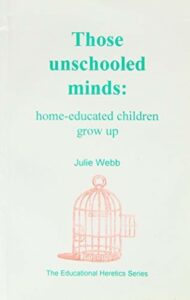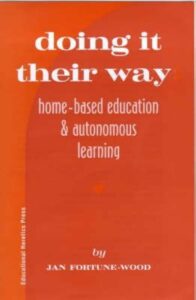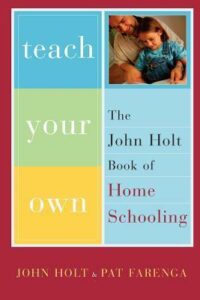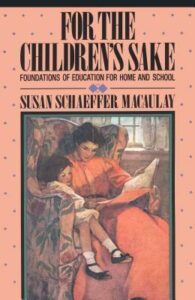There are many books about home education. Those listed below are a few of my recommendations, covering a wide range of styles and philosophies, with the most recently published at the top. There are links to Amazon UK for each book. (As an Amazon UK associate, I earn commission from any qualifying purchases.)
You can find books about parenting in general on the parenting books page.
‘Home Education – What? Why? How?’ by Sue Fairhead
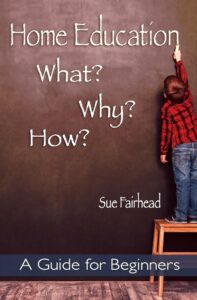
This is my own book, published on the 20th anniversary of this website. It includes some of the basic content from the site and has taken many years to produce.
The book is intended as a guide for beginners to home education, or for those considering their options. It attempts a balance, offering some starting points and suggestions. I try to make the point that every child and every family is different. What works in one situation may not be appropriate or right in another family or with another child.
The book touches on learning styles and looks at parenting philosophies, as well as briefly explaining some of the popular home education methods. It also includes some anecdotes from our own journey, as examples of how learning at home can work.
Available to buy from Amazon in both paperback and Kindle form; it is also part of the Kindle Unlimited programme.
‘Natural Curiosity: Educating and Nurturing Our Children at Home ‘by Lisa Carne
This book is a refreshing introduction to a family who unschool, using the children’s strong interests in the natural world and natural history to develop their own learning styles. It doesn’t say how to home educate, but gives many examples of how it works in one particular family.
The book charts the children’s learning from babyhood, and the parents’ dedication to what they term EPIC education: Explore, Ponder, Imagine and Create. They helped their children notice birds, insects, plants and other wonders of the natural world when they were small, and then continued this focus even when the children decided, for a few years, to go to the local primary school.
For the past couple of years the children – a boy and a girl – have been educated at home. There are many examples in the book of the ways they learn without any pressure, time commitments or curriculum requirements. Nevertheless, they manage to learn a great deal through spending time outside, as well as through reading, through conversations, through questions, and through technology.
It’s all quite upbeat and encouraging with many distractions and notes that make it better for dipping into rather than reading straight through. There’s a chapter on parenting style too, and one on how the natural world impacted many famous people, some of whom (but not all) were themselves educated at home.
‘Learning Without School’ by Ross Mountney
The author is a former school teacher who has home educated her children for many years. In this book, she describes the process of home education for anyone interested in knowing more. She explains what is meant by education and learning, why school is not appropriate for many children, and gives plenty of ideas for getting started. She relates much of the book to what is learned in school – since that’s what most parents understand – and shows how many children can learn more effectively without going to school.
There is a useful chapter on ‘special needs’ – by which she refers to anyone who does not fit into the ‘norm’ expected in a school education – and an overview of different styles of learning with an emphasis on the need to be flexible. There are some anecdotes from the author’s own experience, including times when she changed her approach or ideas, and text-boxes with quotations from other home educating parents.
My only slight quibble with this book is that the Local Education Authorities are claimed to have responsibility for the education of all children. This is not the case, since parents in the UK have the prime responsibility for education. Still, for anyone interested in how home education might work, in theory and in practice, or who is seriously considering educating their children at home, I would recommend this book.
‘How Children Learn at Home’ by Alan Thomas and Harriet Patterson
I haven’t read this book, which was published in 2007, but a friend has recommended it highly. One of the authors wrote another book, still in print, as the result of extensive research in the UK and Australia – mostly factual, but encouraging to those wishing to home educate.
This particular book emphasises the role of informal, apparently random study. It states that children learn in the way at least as much, if not more than their school-going contemporaries. This is despite schools educating children in, supposedly, logical sequences.
This may all be obvious to home educating parents. However the author presents it well, from an academic background. It’s the kind of book that you could buy for relatives or friends who are dubious about the theory of home educating. It is particularly good for those who don’t understand the ideas behind unschooling or autonomous education.
‘Free Range Education’ edited by Terri Dowty
Twenty British families (including ours) wrote individual chapters in this book. Each one explains why they chose to home educate and gives an idea of their philosophy. This book contains a fascinating series of vignettes into home education at the end of the 20th century.
Some frequently asked questions are answered in between chapters. But the majority of the book describes what home education is like from day to day in different households. Most of them are informal: some are entirely autonomous. Others use at least a few National Curriculum or other text-books. The overall feeling coming from this book is of happy, healthy children and teenagers. They enjoy the challenge of learning, and are confident about their future.
This book is ideal for parents considering home education. I would also recommend it for home educators who are looking for inspiration and encouragement. Unfortunately this is no longer in print, and the second-hand prices tend to be high. But if you can find it in your library, or inexpensively in a charity shop, this is well worth reading.
‘Those Unschooled Minds’ by Julie Webb
This book is based on interviews with twenty home educated people in their twenties, or older. The author first spoke to them in their teens, while they were still being educated at home. She wanted to find out what they thought about the pros and cons of home education.
There are lots of interesting insights in this book. I felt it was an encouraging tribute to the ground broken by those families who opted to educate their children at home in the 1980s and before. At this stage, home education was a barely recognised option in the UK.
Read this if you wonder what happens when home education finishes. It demonstrates whether young adults who have not been to school are able to deal well with employment and adult society. Inevitably it’s somewhat out of date now. But I still thought it was an inspiring read.
‘Doing it their way’ by Jan Fortune-Wood
This book describes thoroughly the ‘autonomous’ method of home education which is popular in the UK. It examines various theories of raising children and of educating. It explains why the author believes strongly in child-led education. She shows how vital it is for parents to be fully involved in their children’s lives, and to take them and their concerns seriously.
I didn’t agree with every word in this book. The author makes the assumption, for instance, that every child, if raised non-coercively, will make wise choices. She also assumes that a fully autonomous lifestyle is always possible. She states that, if we take the time, we can discover a mutually agreeable solution to any problem. The principle is good, but in practise I found we didn’t always have the available time. Moreover, some children, in my experience, benefit from more parental guidance than this book would allow.
Nonetheless, I recommend this highly. Even if you don’t agree, it can help you determine your own parenting philosophy.
‘Teach your Own’ by John Holt
I haven’t actually read this book – or not in the updated edition, anyway – but home educators consider it a classic. John Holt was one of the early promotors of interest-based education. He pointed out the futility of mass learning for many children. This is a revised edition, helping parents understand that education should be relaxed and interesting. Most importantly, education should grow out of the children’s own motivation.
There are chapters on living with children, and on working with children who have special needs. There is also plenty of discussion of ‘serious play’, according to the synopsis.
It also has financial and legal advice, and suggestions for co-operating with local schools. However that is probably more relevant in the USA than the UK.
‘For the Children’s Sake’ by Susan Schaeffer McCauley
This book is based on the research of Charlotte Mason. She was a British educator from the early 20th century. It examines the style of this radical thinker, seeing how relevant her ideas were to the modern child. Children in the early 21st century are not so different, at their core.
The book shows how parents or teachers can follow Charlotte Mason’s principles in a small school or in the home. In a nutshell, she believed that children should have a lot of freedom. She believed, too, in good books (she called them ‘living’ books) rather than pared-down tedious readers. She also insisted that that children should spend a lot of their time outside.
Susan Schaeffer McCauley educated her own children at home. She gives examples of how she approached their learning. This book is ideal for anyone interested in Charlotte Mason’s principles. The original books are rather long-winded and old-fashioned, and it’s difficult to find them. This one feels dated now, too, but I found it very interesting and inspiring, nonetheless.
